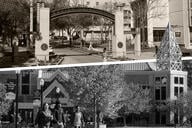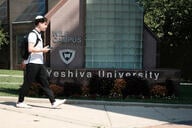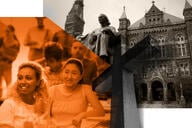You have /5 articles left.
Sign up for a free account or log in.
Religious institutions have long had leeway to hire and fire based on creed. But what happens when a man who professes the faith also starts to appear on campus as a woman?
At Spring Arbor University, a Michigan institution affiliated with the Free Methodist Church, the pending termination of a transgender faculty member (and ordained Baptist minister) has raised just that question. John -- who now goes by Julie – Nemecek, the former associate dean for The School of Adult Studies, said she was demoted after sharing her diagnosis of gender identity disorder with supervisors. She has filed an Equal Employment Opportunity Commission complaint, alleging that the university discriminated against her based on sex and perceived disability.
Meanwhile, Spring Arbor asserts its right to counter behavior in "direct conflict" with its religious ideals. In a written statement, Spring Arbor's leadership affirms that its expectation for faculty to “model Christian character” is “clearly communicated to students, faculty, and administrators alike, and is protected by the U.S. Civil Rights Act and supported by the Michigan Civil Rights Commission."
Nemecek, a 16-year employee who is on hormone treatments and typically dresses “en femme” (her phrasing) when in public, said she first informed the president of Spring Arbor of her gender identity disorder diagnosis -- and her plans to treat it in part with behavioral modifications, including wearing makeup and fingernail polish and dressing in feminine clothes -- in December 2005. Nemecek said the university subsequently demoted her from the associate deanship position to a non-tenure track associate professor of adult studies position, with an accompanying 20 percent pay cut, and this winter informed her that she would be terminated as of June.
The termination decision comes after more than a year of isolation and restriction, Nemecek said. Under the terms of her current contract, Nemecek, who has her doctoral degree in education, is to teach only online courses and to work from home. The conditions of the contract, as provided by Nemecek, also call for her to "refrain from discussing his transgender situation with Spring Arbor University personnel or students," requires that she not wear makeup, feminine clothing, or otherwise represent herself as female or transgender while on campus, requires her to seek counseling from a Christian professional who could provide “alternative perspectives,” and states that the “university will request permission to receive updates on the state of his condition.”
Subsequently, Nemecek said she received correspondence in October citing her for, among other things, wearing makeup and earrings to a campus learning fair and wearing university apparel to the grocery store (“Unless the university wishes to provide me with $300 or so to replace my SAU paraphernalia, I have no intention of changing my clothing to go to the grocery store,” the EEOC complaint reads).
Mediation on the EEOC complaint, in which Nemecek seeks unspecified damages and a reinstatement to her former position or a fiscally comparable faculty appointment, is scheduled for March, she said. If the mediation fails, she plans to file a federal lawsuit.
“What they have from the state is a statement that they can hire Christians. My beliefs are about as orthodox as they come and, if anything, this has strengthened my faith, not weakened it,” said Nemecek, who identifies as a conservative evangelical and does not plan to undergo sexual reassignment surgery in part due to her respect for her marriage.
“The university has a very clear statement of faith. I’m in full agreement with everything in it. They have a code of conduct; I’m in full agreement with what they say there too. They really have nothing in either of their statements or the denomination they’re affiliated with that would justify the way they’re responding to me,” Nemecek said.
A university spokesman referred all comment on the matter to a Grand Rapids-based public relations firm, which confirmed Spring Arbor’s decision not to renew Nemecek’s contract after the spring semester.
"We first learned of John’s situation a year ago and have worked closely with him ever since. At the same time, as an evangelical Christian university, Spring Arbor requires its faculty and administrators to be Christians and to follow biblical principles in all aspects of their lives as part of their positions as leaders of the university and our students. Our curriculum integrates faith in all aspects of our liberal arts education, and we expect our faculty to model Christian character as an example for our students,” the statement released by the public relations firm reads in part.
“Spring Arbor University has faced situations in the past where the actions of faculty members have been in direct conflict with the ideals we uphold. We approach all situations like this with grace and in all cases work with the individual to give them the opportunity for restoration. However, if they choose to persist with activities that are inconsistent with the Christian faith, we have a responsibility to take further action,” it concludes.
“It’s a really messy area of law,” said Robert Tuttle, a professor of law and religion at George Washington University in Washington. “The questions involve the right of religious organizations to hire people based on religion, but at times the categories of religion creep over into other protected categories.”
The university will likely be on strong ground when it comes to the removal of Nemecek from her associate deanship, Tuttle said, since religious institutions are granted broad latitude by the courts to pick and choose their leaders. The termination of a faculty member, on the other hand, is usually subject to more stringent legal analysis, he said. But dozens of similar cases are out there in litigation, Tuttle said, and courts often draw fine lines about when religious institutions are and aren’t protected. “It’ll be interesting to watch.”




